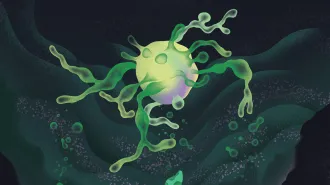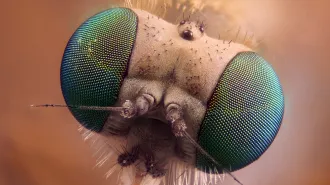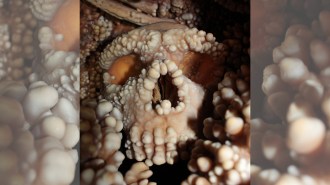Puzzling cosmic signals, processed food defined and more reader feedback
- More than 2 years ago
 To edit or not
To edit or not
A controversial paper about modifying genes in fertilized human eggs raised some serious ethical concerns. Tina Hesman Saey covered researchers’ arguments for and against this type of genetic engineering in “Editing human germline cells debated” (SN: 5/30/15, p. 16).
Many readers embraced the idea of making permanent changes to human DNA. “If someone wants to genetically modify themselves or their offspring, why should somebody else’s antiquated morals stop them?” asked nkj123. “It’s only a matter of time before we learn to cure diseases, improve health and increase life span. These experiments will happen, because many of us are not clinging to rigid notions of what it is to be human.” In an e-mail, Justin Cody urged researchers to proceed with caution when tinkering with egg and sperm cells, but added, “we should be promoting the future of the species aggressively and wringing our hands a lot less.”
Not everyone was excited, however. Commenting on Science News’ website, Hung Chau wrote, “I hope we know what we are doing.”
Food for thought
Gut microbes aren’t fond of junk food. In “Food fight” (SN: 5/30/15, p. 18), Laura Beil described how fatty, salty and sugary foods disturb intestinal ecosystems, leading to inflammation and other health problems.
“I have seen references to ‘processed foods’ often in writings on the subjects of diet and nutrition. However, the authors, Ms. Beil included, never give a definition of the term ‘processed’ — as if everyone knows what that term means,” wrote Calvin Farwell. “I’m interested in a clear, operational definition — one that I can use to determine whether any particular potential mouthful is ‘processed’ or not. And I hope that I don’t starve to death after reading her definition!”
Beil says that, generally speaking, processed foods are those that are altered from how they occur in nature so that they can be sold in boxes, bottles, jars and cans. Not all are bad. Bagged frozen broccoli counts as processed, for example. “The most heavily processed tend to be the ready-to-eat meals and snack foods. The reason they are often unhealthy is that they contain high amounts of added sugars and fats, and low amounts of fiber. They also tend to contain a lot of additives to extend shelf life and add texture,” she says. “I once had a nutritionist tell me a good rule of thumb is that the longer the list of ingredients on the package — often an indication of how processed it is — the less likely it is to be healthy.”
Beware the microwave
In “Source of puzzling cosmic signals found— in the kitchen” (SN: 5/16/15, p. 5), Christopher Crockett reported that researchers working with the Parkes telescope in Australia discovered a downside to opening microwaves before they’re done cooking.
“This sounds like something out of a Douglas Adams novel,” observed Ray Andre Haddock on Facebook. Robert Fowler saw the incident as an important lesson in carefully checking research results. When astronomers Arno Penzias and Robert Wilson discovered the cosmic microwave background, they “thought they had found pigeon poop instead of evidence for the Big Bang, and spent weeks cleaning their antenna,” he wrote. “In one of his books, Richard Feynman talked about the enormous effort a scientist has to put into making sure experiments are not compromised.”
Corrections
“Tiny explosions add up to heat corona” (SN: 5/30/15, p. 7) incorrectly said that nanoflares occur on the sun’s surface. They occur in the corona.
Part of a sentence was left out on Page 15 of “Snagging clots upgrades stroke care” (SN: 6/13/15, p. 14). The full sentence should read: “Downstream, about 2 million neurons die on average each minute until blood flow is restored, Hill says.”







